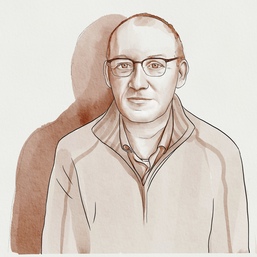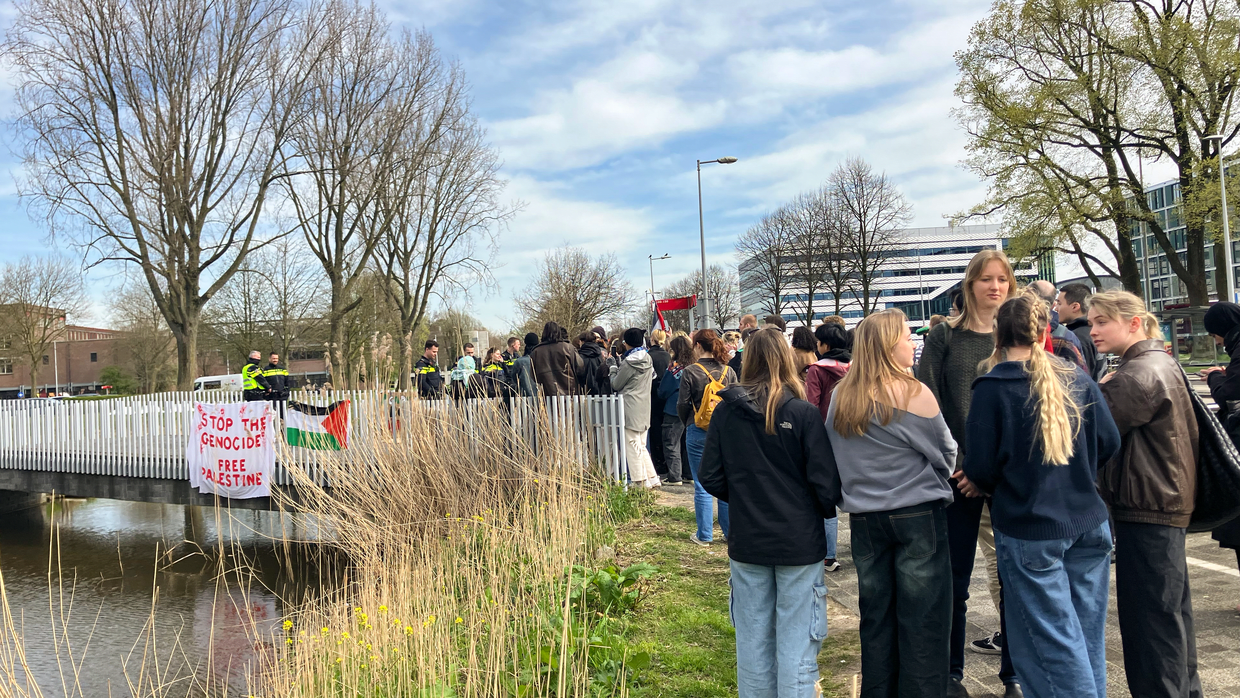
What the protests at AUC really reveal
That the pro-Palestine protests at Amsterdam University College (AUC) aim to boycott Israel is highly questionable, argues AUC lecturer Cor Zonneveld. But what then is the aim? “The conflict between protesters and management at AUC can be seen as a renewed attempt to integrate social justice activism into AUC’s policies and decisions.”
Late October 2023, the Israeli army started an attack on the Gaza Strip, with the stated aim to destroy Hamas. In this war, tens of thousands of Palestinians have been killed, often as “collateral damage”. The war continues to date, and the end of the humanitarian disaster is not yet in sight.
Soon after Israel attacked the Gaza Strip, worldwide protests against the war commenced. At the whole of UvA, including AUC where I teach, students also engaged in active displays of disapproval of the situation. Initially, these protests took place inside the Academic Building of AUC. With the use of megaphone, messages were conveyed, often ending in repetitive shouting of the battle cry of the protesters, “From the river to the sea, Palestine will be free”.
AUC management engaged with protesters early on, but refused to yield to their demands, emphasizing the importance of maintaining the educational process without disruptions. The demonstrations escalated into a clear conflict when protesters began blocking the building’s entrance on February 5. Later, the entrance to the building was blocked daily, during a period with many exams planned to take place in the building.
Police assistance was sought to end the blockade, resulting in the arrest of protesters. During the period of intense protests, slogans were sprayed on the Academic Building and a window was smashed by heavy objects. The blockades came to an end when the following class-free week began, and even though the protests have now moved to more central UvA-locations, many of us feel we haven’t seen the last of the protests at AUC.
Here, I would like to argue that the conflict is fundamentally one between management and a faction of AUC (staff and protesters), about the kind of institute AUC should be. The original cause is no longer the main issue; the conflict has become self-perpetuating, as neither side can back down without significant loss of credibility.
Firstly, I argue that the protesters’ objectives will unlikely impact the situation in Gaza. Despite political pressure from the USA and the International Court of Justice’s provisional findings in the South Africa vs. Israel case, Israel shows little responsiveness to end the war or consider the welfare of Palestinian civilians. Given this, it’s improbable that any public statement by AUC would alter Israel’s approach to the Gaza conflict. But if meeting all demands would make no difference, there must be another motive behind the ongoing protests.
Secondly, I argue that the protesters feel a deep resentment towards management. Here are some quotes to support this view (emphasis in original): “The Management Team had no option but to respond to the action, thus revealing their true faces to the entire community”; “The Dean attempted to distance himself from the arrests and suppression using passive language in DCT communications with students”; “AUC and UvA revealed how far they are willing to go to defend their ties to genocide”. The following quotes are from the AUC arrestees, published in AUC’s student magazine The Herring: “The police violence and criminalization we encountered at the picket of the AUC academic building has shaken our community and exposed the university management’s willingness to put their students at the risk of physical and mental distress in order to crush demonstrations and protect their investments in “Israel’s military occupation””; “The decision to block the entrances to the Academic Building was a direct result of management’s continued unwillingness to seriously consider AUFP’s demands”; “Despite the shocking display of police violence on the first day of the blockade, AUC continued to threaten its students’ safety by openly coordinating with and authorizing the police to arrest students the following three days”. In short, the protesters keep management responsible for many things, including complicity to genocide, but especially endangering the well-being of their own students.
Protesters accuse management of contributing to police violence while asserting their actions are non-violent, but the definition of “violence” remains ambiguous. They consider police actions as brutal but view their own coercion and disruption as non-violent. However, their actions restrict freedom and disrupt campus activities, leading to intimidation and safety concerns. This maneuvering aims to blame management while absolving themselves of responsibility. lecturers. Many fear that criticism will result in intimidation, retaliation, or disciplinary actions against us as employees. These fears have, for months, curtailed our ability to raise concerns”.
Thirdly, I argue that a considerable faction of AUC staff has embraced the protests to criticize their own management. As the protests intensified, a lecturer publicly addressed the dean in a letter using language akin to that of the protesters: “We demand that AUC stop calling on the police out of concern for the safety of students to whom we have a duty of care. The criminalisation of protest actions does not foster a healthy and safe learning space and is not aligned with our values as educators”.
Like the protesters, dissenting faculty claim to be victims of the management approach: “At this point it is clear beyond doubt that the heavy-handed approach has failed. It also had a chilling effect on our sense of safety and integrity as lecturers. Many fear that criticism will result in intimidation, retaliation, or disciplinary actions against us as employees. These fears have, for months, curtailed our ability to raise concerns”.
Finally, I contend that the driving force of the conflict no longer concerns the situation in Gaza, but internal politics. In a communication to all staff (March 13), the protesters outline several “provisional demands”: “AUC must immediately begin democratically revising AUC’s House Rules in conversation with the entire student body as well as faculty, and make them independent from UvA’s House Rules”; “Effective immediately, political free expression in support of Palestine and its liberation should be allowed on the AUC campus”; “Speakers at the teach-ins and all AUC lecturers in general should be made to feel safe to speak up about their positions against the military occupation of Palestine”; “AUC must commit to offering additional support services for Palestinian students at AUC, and for Arabic and Anti-Zionist Jewish students who currently feel unsafe on Campus”. Here, the shift in focus is evident. The activists seek rule changes through demands rather than established channels. Intimidation, disruption, and vandalism seem justified to achieve these aims.
The demands of AUC activists may seem modest when compared to for instance the ambitions of protesters at Colombia University: “This is part of global awareness against oppression. Rebellion is necessary to disrupt power”. [1]Despite the difference in ambition level, activists from Colombia University and AUC share a view of reality in which social dynamics result from power dynamics between oppressor and oppressed, and both acknowledge the significance of emotions and values such as identity, equality, and justice. The conflict between protesters and management at AUC can be seen as a renewed attempt to integrate social justice activism into AUC’s policies and decisions. Notably, 25 out of 27 signatories of the open letter to the dean teach Social Sciences and Humanities at AUC, areas closely linked to social justice activism.
In the last six months, AUC has encountered its most significant crisis in its 15-year history. While the tragedy in Gaza is widely recognized, the protests have redirected attention towards a power struggle with management. Although these protests will never impact the situation in Gaza, some believe they could enhance AUC by urging management to address and fulfil the demands of the activists.
The activists accuse management of polarizing behaviour, yet they employ a similar tactic by projecting their actions onto others. While the continuous shouting of the Palestine slogan may be perceived as threatening by many, the activists do not see it as polarizing. Actions like blocking and vandalizing the building, as well as deliberately getting arrested and then portraying themselves as victims of police violence, are not considered polarizing by the protesters. However, many believe that the activists are largely responsible for the escalation and polarization.
Calls for reconciliation between the opposing camps have been made. Is there hope for reconciliation? I doubt it, as neither party can back down without significant loss of credibility. AUC won’t suddenly admit complicity in genocide, nor can it sever non-existing ties with Israeli institutes. Conversely, the protesters cannot afford to accept defeat without major loss of face. Logically, the best choice for the protesters is to disengage from AUC. Studying at a college they deem racist and complicit in genocide implicates one in these acts. And who would seek a diploma from an institution accused of racism, endorsing police violence, and complicity in genocide?

